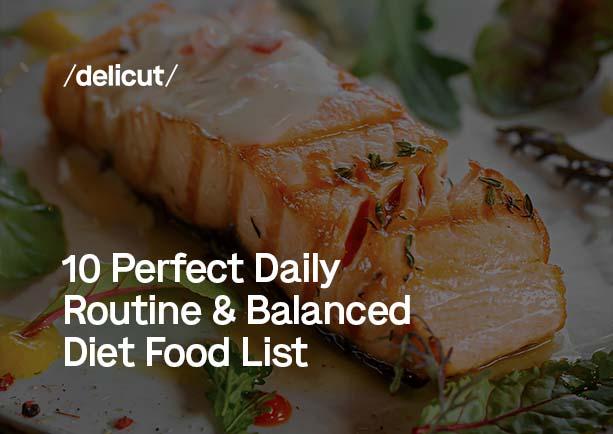10 Perfect Daily Routine & Balanced Diet Food List

In the quest for optimal health and wellness, the synergy of a balanced diet and a well-structured daily routine cannot be overstated. It's not just about the foods we eat but also about when and how we eat them. A harmonious blend of these elements is crucial for maintaining physical health, mental clarity, and overall vitality.
This blog delves into the essence of crafting a daily routine that complements a balanced diet, guiding you toward a lifestyle that nurtures your body and mind.
What is a Balanced Diet?
A balanced diet is the cornerstone of good health, encompassing a diversity of nutrients essential for the body's optimal functioning. At its core, a balanced diet includes a variety of foods that provide the necessary macronutrients - carbohydrates, proteins, and fats - as well as vital micronutrients like vitamins and minerals.
Carbohydrates are the primary energy source, proteins are crucial for repair and growth, and fats are important for hormonal functions and cell health. Meanwhile, vitamins and minerals, though required in smaller quantities, play pivotal roles in numerous bodily processes, from supporting the immune system to bone health.
The key to a balanced diet lies in consuming these nutrients and choosing the right foods to fulfill these requirements. Whole grains, lean proteins, healthy fats, and a colorful array of fruits and vegetables are the building blocks of a nourishing diet.
By understanding these principles, one can make informed choices that lead to sustained well-being and prevent nutritional deficiencies.
Morning Rituals for a Healthy Start
How you start your morning sets the tone for the rest of your day, especially regarding your dietary habits. A healthy morning routine begins with hydration; drinking a glass of water upon waking up activates your internal organs and kick-starts your metabolism.
Following this, a nutritious breakfast is essential. It should ideally include a balance of complex carbohydrates for sustained energy, proteins for muscle health, and fibers for digestive well-being. Options like oatmeal with fruits and nuts, a smoothie packed with greens and seeds, or a vegetable omelet with whole-grain toast can provide this balance.
Incorporating mindfulness into your morning meal can also make a significant difference. Eating without distractions, chewing thoroughly, and savoring each bite enhances digestion and helps you better recognize your body’s hunger and fullness signals, preventing overeating.
Mid-Morning Snacks: Choices That Matter
The mid-morning snack is a pivotal element in maintaining energy levels and preventing overeating at lunch. Opting for nutrient-dense snacks can curb hunger and provide essential nutrients.
Ideal choices include a handful of nuts rich in healthy fats and proteins, Greek yogurt with a sprinkle of berries for a probiotic and antioxidant boost, or a piece of fruit with a small serving of nut butter for a balanced fiber and healthy fats intake. These snacks nourish the body and keep blood sugar levels stable, sustaining your energy until the next meal.
Balanced Lunch: Combining Macros and Micros
A well-rounded lunch should include a source of lean protein, such as grilled chicken, tofu, or legumes, to support muscle maintenance and satiety. Complex carbohydrates like quinoa, brown rice, or whole-wheat pasta provide lasting energy, while a variety of vegetables add essential vitamins and minerals.
Including a small portion of healthy fats, such as avocado or olive oil, enhances nutrient absorption and adds a satisfying richness to the meal. This balance ensures a steady release of energy, avoiding the mid-afternoon slump.
It’s also an excellent way to incorporate different colors and textures into your diet, making meals more enjoyable and nutritionally diverse.
Afternoon Habits: Energy Maintenance
The afternoon is a critical time for maintaining energy and focus. Small habits can significantly impact your overall well-being. A short, brisk walk or a few minutes of stretching can reinvigorate the body and mind, boosting blood flow and alertness.
Additionally, staying hydrated is key; sipping on water or herbal tea helps maintain hydration levels, which is essential for cognitive function and energy. Opt for a small, healthy snack, like a piece of fruit or a handful of trail mix, to keep your metabolism active and prevent fatigue, setting the stage for a productive remainder of the day.
Dinner: Light and Nutritious
Dinner is vital in how we wind down for the day and prepare for restful sleep. Eating a light yet nutritious meal can aid digestion and improve sleep quality. Aim for a balance of lean proteins, such as fish or grilled chicken, and a generous serving of vegetables to ensure a meal rich in nutrients yet light on the stomach.
Incorporating whole grains like barley or farro can add a satisfying element without heaviness. It’s beneficial to eat dinner a few hours before bedtime, allowing the body ample time to digest. This meal should be about nourishment and satisfaction without overindulgence. Seasonal produce, herbs, and spices can add flavor and variety, making healthy dinners enjoyable and something to look forward to.
Evening Routine: Preparing for the Next Day
Your evening routine is crucial for setting the stage for a successful tomorrow. Dedicate time to unwind and relax, reducing exposure to screens and engaging in calming activities like reading or meditative practices. Planning for the next day, such as preparing a healthy lunch or organizing your schedule, can alleviate morning stress.
Ensuring a consistent bedtime and creating a sleep-conducive environment, like a cool, dark room, aids in quality rest. These practices promote better sleep and help maintain a balanced diet and routine by fostering a mindset of mindfulness and preparation.
Creating a Customized Food List for Your Needs
Tailoring a food list to your individual dietary needs and preferences is a key step in sustaining a balanced diet. Start by identifying your nutritional requirements, considering factors like age, activity level, and any health concerns or dietary restrictions.
Include a variety of foods from all food groups to ensure a wide range of nutrients. Whole grains, lean proteins, healthy fats, and plenty of fruits and vegetables should form the foundation of your list.
Experiment with different foods to discover what works best for your body and palate. Incorporating seasonal and local produce can add freshness and variety to your meals. Don't forget to update your list periodically to reflect changes in your dietary needs or goals.
Conclusion
The ten steps outlined in this blog provide a roadmap to integrate mindful eating habits and effective routines into your life. Remember, the essence of a balanced diet is not just about what you eat but also how and when you eat. Combining this with a well-organized daily routine creates a holistic approach to health that benefits both body and mind.
Small, consistent changes can lead to significant, long-lasting impacts. Embrace this journey with patience and an open mind. Experiment, learn what works best for you, and enjoy nurturing yourself.
FAQs
1. What 10 foods should you eat every day?
Eating a variety of foods daily is crucial for balanced nutrition. Ten key foods include:
Leafy greens (like spinach or kale) for vitamins and minerals.
Berries for antioxidants and fiber.
Nuts for healthy fats and protein.
Whole grains (like quinoa or brown rice) for fiber and energy.
Yogurt (preferably Greek) for probiotics and calcium.
Fish, particularly fatty fish like salmon, for omega-3 fatty acids.
Eggs for protein and essential nutrients.
Legumes (like lentils or chickpeas) for plant-based protein and fiber.
Avocado for healthy fats and vitamins.
Sweet potatoes for fiber, vitamins, and minerals.
2. What are the 10 most healthy foods?
The most healthy foods typically offer high nutritional value and health benefits:
Berries: High in fiber and antioxidants.
Leafy green vegetables: Rich in vitamins, minerals, and fiber.
Nuts and seeds: Source of healthy fats and proteins.
Whole grains: Provide essential B vitamins and fiber.
Fatty fish: Rich in omega-3 fatty acids.
Olive oil: Heart-healthy monounsaturated fats.
Garlic: Offers medicinal properties.
Legumes: Great plant-based protein source.
Yogurt: Contains probiotics for gut health.
Avocados: Full of healthy fats and vitamins.
3. What is the best diet for daily routine?
The best diet for a daily routine is one that is balanced, sustainable, and suits your individual nutritional needs. It should include:
- A variety of fruits and vegetables for vitamins and minerals.
- Whole grains for sustained energy.
- Lean proteins for muscle health and satiety.
- Healthy fats for brain health and nutrient absorption.
- Incorporating these elements in regular, well-portioned meals, while staying hydrated and limiting processed foods, sugars, and excessive caffeine or alcohol, is key.
4. What are 10 good food habits?
- Ten good food habits to incorporate into your routine are:
- Eating a variety of nutrient-rich foods.
- Including plenty of fruits and vegetables in your diet.
- Choosing whole grains over refined grains.
- Opting for lean protein sources.
- Incorporating healthy fats like olive oil and avocados.
- Staying hydrated with water and herbal teas.
- Eating mindfully and savoring your meals.
- Avoiding excessive sugar and salt.
- Planning meals and snacks to avoid impulsive eating.
- Listening to your body’s hunger and fullness cues.
Trending Searches:
Meal Plan Dubai | Affordable Meal Plans Abu Dhabi | Meal Plan Ajman | Meal Plan Al In | Meal Plan Sharjah | Meal Plan Subscription
Related Blogs
The Burnout Diet
Jan 30, 2026 | 8The mental load of “What should I eat today?"
Jan 22, 2026 | 8The real glow-up starts with your gut health
Jan 14, 2026 | 8Healthy food that doesn’t taste like “Diet Food”
Jan 17, 2026 | 8Why do most people in the UAE get their calories wrong
Dec 8, 2025 | 6DASH Diet Meal Plan
Nov 11, 2025 | 8Fatty Liver Meal Plan
Oct 31, 2025 | 8Pregnancy Diet Meal Plan
Oct 27, 2025 | 82000 Calorie Meal Plan
Oct 1, 2025 | 8Intermittent Fasting Diet Plan
Sep 5, 2025 | 8






